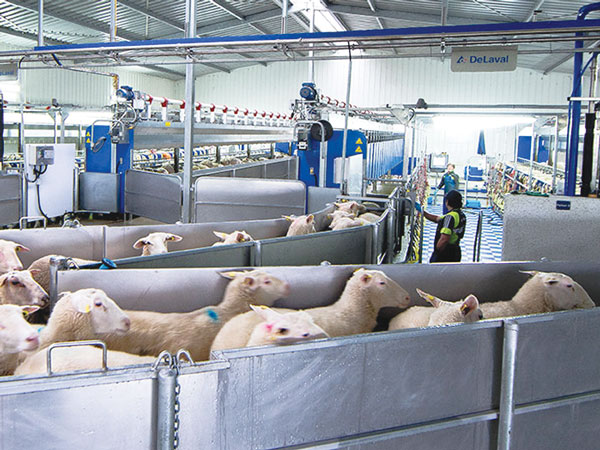Blue River Dairy eyes new markets after China success
Sheep infant nutrition maker Blue River Dairy is hoping to use its success in China as a springboard into other markets in future.
The sheep milk industry is setting its sights on the dairy industry as it looks to pick up more farmer suppliers.
Sheep milk producer Spring Sheep Milk Co, claiming good growth during the 2018-19 financial year, says the time is right for established farmers to get into the industry.
Business manager Thomas Macdonald says international demand for New Zealand sheep milk products is strong, and he’s noticed more farmers inquiring about converting their dairy farms to sheep milk.
“Heading into our fifth dairy season we are noticing a lot more interest in the industry,” says Macdonald. “Last year I might have received around one inquiry a month from a farmer looking at their options, but those inquiries are now coming in thick and fast.”
Spring Sheep milks 4000 sheep on three farms in central North Island. Milk is processed at Melody Dairies’ spray drier at Waikato Innovation Park in Hamilton.
Because demand is mostly from Asia, driven by consumers’ increasing preference for alternative milks and nutritional focused products, growth in this market is high on Spring Sheep’s agenda, Macdonald says.
Dairy farmers in Waikato, being within the two-hour travel zone for processing, would be ideal suppliers, he says.
“The Waikato region is rich dairy country, and the pastoral farming practices and core skillset of dairy farming found here are easily transferred to sheep milk.
“The optimal sheep milking system in NZ requires the use of high-performance genetics, combined with a farming system that utilises our pastoral advantage. We now have those genetics available and we’re looking to work with passionate, skilled dairy farmers with high-quality land.”
Federated Farmers Waikato president and Fonterra supplier Andrew McGiven says he hasn’t heard of dairy farmers looking to convert to sheep milk.
“But if the returns are there and it is a viable option then I don’t see why farmers wouldn’t look at it,” he told Dairy News.
“Most I know are looking at organics to improve the bottom line, but if sheep milk has a better operating profit and is more environmentally sustainable then it will appeal to some.
“Milk prices in dairy farming have been very volatile for some time now as we all know, so if sheep milk can give a more stable rate of return and avoid some of the rigorous compliance requirements that dairy are subjected to, then it could be an attractive alternative, especially for the smaller farms,” says McGiven.
Productivity doubles
Last year Spring Sheep doubled its productivity thanks to new genetic lines imported from Europe.
Previously NZ-bred ewes were producing 120L each per season, but the new high-performing genetic lines have the potential to increase production to over 600L per ewe per season.
Spring Sheep business manager Thomas Macdonald says most farming systems need about 250-450L per ewe per season to achieve a good return.
“So the improved productivity we’re seeing presents a good opportunity for farmers considering a conversion to sheep dairy farming.”
Spring Sheep has two farms near Cambridge and one in Reporoa. It has just finished its first season successfully running three farm system trials: full grazing outdoor, hybrid indoor-outdoor grazing and large scale hybrid models.
 Macdonald says the growth in the industry is encouraging for farmers who are looking at sheep milk as a viable, high-return farming option.
Macdonald says the growth in the industry is encouraging for farmers who are looking at sheep milk as a viable, high-return farming option.
“As a value-added product, sheep milk isn’t at the mercy of fluctuating market prices so the farm gate price remains stable,” he says.
He recommends two farm models for those looking to get into the industry: a hybrid indoor-outdoor grazing model and a fully outdoor grazing model.
“The grazing model, a bovine-to-ovine conversion, is a former cow dairy farm that’s retrofitted with sheep milking equipment and fences. It has the lower cost of entry of the two models and is highly recommended for those looking to enter the industry.
“We can also provide great wraparound support for farmers, with a tailored farm support programme drawing on our own sheep milking expertise, access to genetically superior dairy sheep and farm data, training and the option of fully managed farms.”
Two farmers and two farming companies were recently convicted and fined a total of $108,000 for environmental offending.
According to Ravensdown's most recent Market Outlook report, a combination of geopolitical movements and volatile market responses are impacting the global fertiliser landscape.
Environment Canterbury, alongside industry partners and a group of farmers, is encouraging farmers to consider composting as an environmentally friendly alternative to offal pits.
A New Zealand dairy industry leader believes the free trade deal announced with India delivers wins for the sector.
The Coalition Government will need the support of at least one opposition party to ratify the free trade deal with India.
Primary sector leaders have welcomed the announcement of a Free Trade Agreement between India and New Zealand.